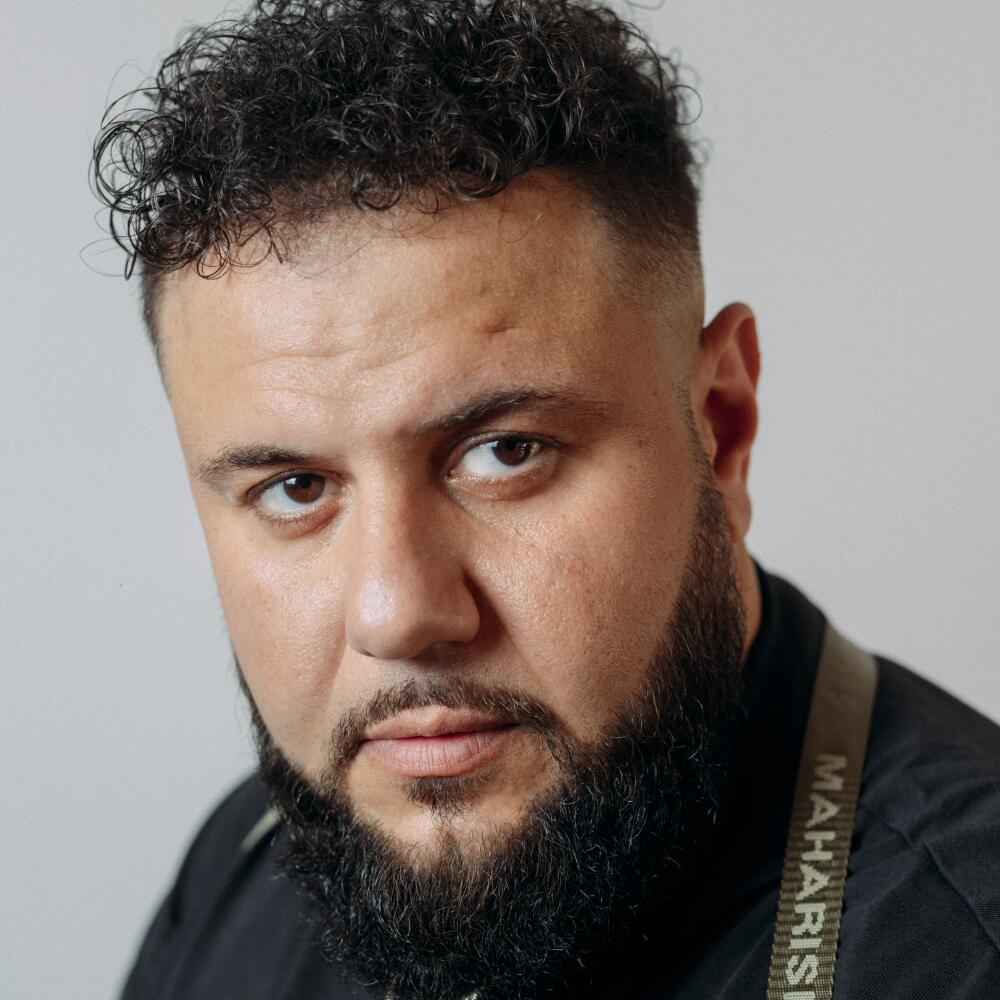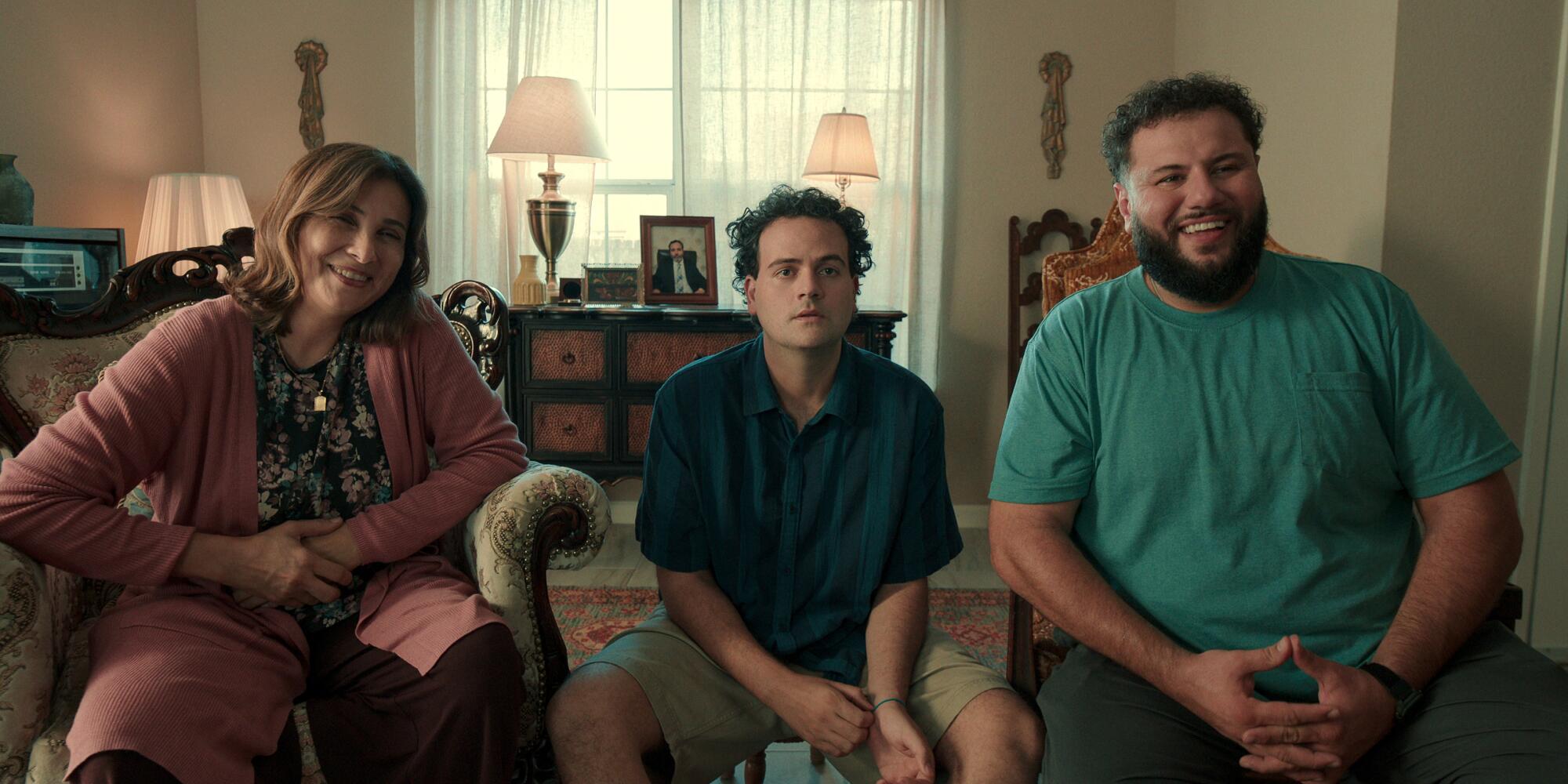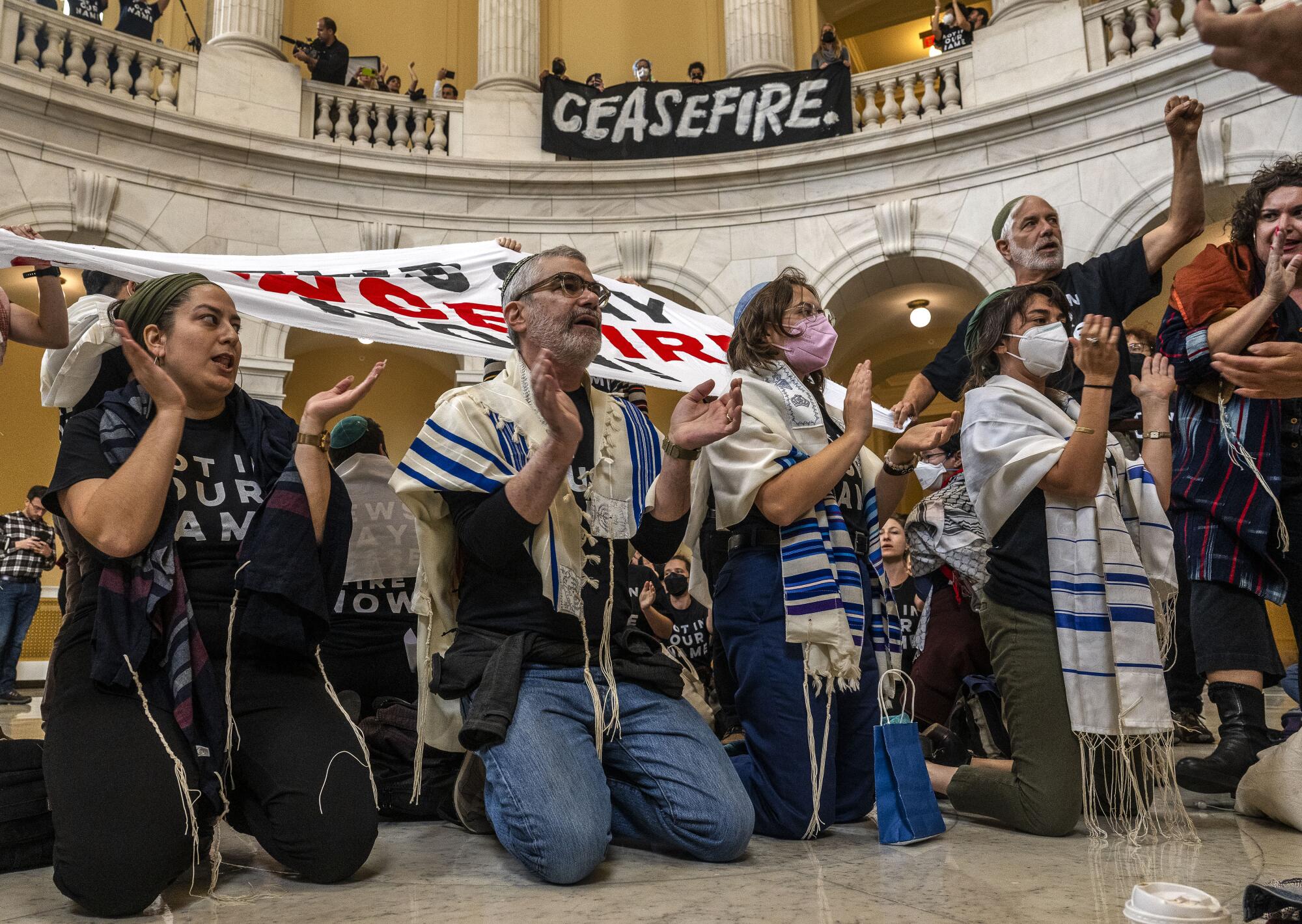
Mohammed “Mo” Amer has forged a career talking about his Palestinian heritage and the plight of his displaced family, first as a successful stand-up comedian, with Netflix specials like “The Vagabond” and “Mohammed in Texas,” and then with his acclaimed comedy series “Mo.” Offering warmth and humor where most might expect to find politics and trauma, Amer’s semi-autobiographical half-hour show centers on the Najjar family and their existence as unauthorized immigrants in Houston. It received wide critical praise upon its arrival in 2022, garnering a Peabody award and a green light for a second season.
But as Amer resumes work on the new season, there’s little to laugh about in the wake of Hamas’ brutal massacre of more than 1,400 Israelis on Oct. 7, and Israel’s relentless bombardment of Gaza that’s killed more than 10,000 people. The pain, suffering and red-hot tensions triggered by the bloody conflict hangs over his writers room, while Amer himself must navigate a polarized climate where his every word is mined for inspiration or weaponization, depending on the perspective.
The Houston-loving comedian hasn’t given any print interviews since the war broke out: Though all opinions about the Middle East today are sure to be politicized, it’s especially true if your name happens to be Mohammed. But Amer says he’s also heartbroken over the trauma and killings of innocent people caught up in a conflict that stretches back 75 years. He still has family in the West Bank, where according to the United Nations at least 132 Palestinians have been killed by Israeli forces and settlers over the last month. Now he speaks with me about what it’s like to work on his hilarious, sensitive and poignant Palestinian comedy in the middle of a war overseas, and how he’s dealing with the high tensions here at home.

You’re writing the second season of “Mo” right now. I can’t think of a more difficult time to be working on a comedy about a Palestinian family.
Does it apply more pressure? Is there more of an onus on trying to make sure that the story is elevated in a way where it’s still making the point? Yes, but the first thing that you have to realize is that you’re not going to make everybody happy. You have to approach it that way, and just be honest, real and grounded.
And quite frankly, the sad part is that the fundamental issues have not changed, because it’s not the first time Gaza has been under bombardment. It’s not the first time the West Bank is experiencing this kind of settler violence. It’s all elevated and heightened, of course, but it’s not anything new so it doesn’t shift the perspective on the show as much as you would think. It just more puts the pressure on us to make sure that we execute it to the best of our ability and we amplify the humanity of it all. Comedy is an extremely powerful tool to create understanding. It sounds so cliche and corny, but it’s true.
Given the many dehumanizing comments about Palestinians in the media and on Capitol Hill, you must feel an increased pressure to represent the fictional Mo’s family as real folks with real feelings.
We’re all realizing how incredibly important this show is. The fact that it’s literally the only television show with a Palestinian family, and a Palestinian lead co-creator at the head [Amer created the show with comedian Ramy Youssef], makes it super important to do [this story] justice. It’s an amazing opportunity to humanize and to create more understanding and give people a point of reference.
Right now, who else is the reference for Americans? There’s no other Palestinian TV family to watch, to relate to or to feel any kind of love toward. The writers and I are feeling the gravity of the situation, and we’re taking it very seriously. Dealing with the emotion, the sadness, and the grotesque nature of what’s going on right now has forced us to fast track really difficult conversations. We’re a diverse group of Jews, Muslims, Christians. There’s people of many different ethnicities around the table, and we all have to deal with what’s happening in real time. In a really dark way, it created a stronger room. A more honest room. It has been a really cathartic process because we’re all mourning. You don’t have to be Palestinian or Jewish to mourn.
Will you be acknowledging the current situation in Israel and Gaza in the show?
Clearly, what happened on Oct. 7 is a tragedy. Any loss of civilian life is a tragedy. Period. And while there’s no way to move forward and build the story without acknowledging what’s happening in the world, it’s also impossible to know how things will unfold. I mean, what’s the world going to be like in a year when the show drops? We can’t tell the future but we can speak about the 75 years that has built up to where we are now, and we’ll definitely be examining Israeli-Palestinian relationships through our characters.

It’s been an incredibly sad and horrific time for anyone who’s paying attention to what’s happening in Israel, Gaza and the West Bank, but particularly for those with roots and family in that region. On a personal level, how are you holding up?
It’s been a whole month now and it’s excruciating. Every day I wake up with a sick feeling in my stomach, but also with gratitude for what I have. I have an immense amount of worry for my people back home. I’m worried about what this will all escalate into because it seems like there’s no end to the violence and the bombardment. And not only in Gaza. There’s been a lot of extremist, settler violence in the West Bank. They’re armed and taking over towns so I’m deeply concerned about that, too.
You’re the only Palestinian on television with a series centered around your heritage. Your stand-up has also been based around your immigrant background and the reality that Palestinians are stateless. But it’s a treacherous time to weigh in on the war. Folks are getting censured, canceled and fired for voicing their opinions. How do you navigate that?
I’ve been trying very hard to be balanced in my own emotions because I’ve realized over the past month that people — whether they’re famous or not, their instinct is to be reactionary, to respond immediately to whatever information they see. But there’s a lot of bad information out there. I was raised to be careful where you get your information from, and having patience is extremely important. When you react so quickly without really knowing much about the situation or examining the history of the region, it’s dangerous. A 6-year-old was stabbed to death in Illinois by his landlord because he was Palestinian. There’s been a spike in Islamophobia and antisemitism. This has to stop. The powers that be love to see people arguing and fighting, so I try my best not to get trapped in that. So much hate can transpire when people post before they think.
Your stand up and TV series are rooted in the very human element of family, relationships and friends while highlighting the plight of a refugee. I think that approach has been a major ingredient in your success. How do you avoid getting mired in the politics of the region, especially now?
It seems like everything that I’ve done thus far has been around humanizing and creating understanding. I express that in my art, but sometimes it’s not enough. That’s why I made that speech at the Jewish Voice for Peace rally in D.C. I didn’t plan it. What I said just sort of came from the heart. It was a very powerful thing to see Jews and Palestinians working together toward peace, especially when most of what we’re exposed to in the media is two sides fighting each other. It’s really important to not allow yourself to get lost in all these political agendas because being reactionary is actually beneficial for those agendas. That’s why my focus has always been with the people.

We can all agree that killing innocent civilians is reprehensible. But sadly, because of all the anger and history, basic humanity is becoming collateral damage in heated arguments over who started what, and how they should proceed.
It’s completely and utterly despicable. To see somebody like [Sen.] Lindsey Graham saying there should be “no limit” put on civilian casualties — it’s a sanitized way to say killing civilians is OK. Women. Children. And that is a becoming a more common sentiment. I read that one GOP House member was proposing a bill to ban Palestinians from [entering the U.S.]. What are you talking about? It’s clear racism. This sort of demonization of Palestinians has been around for a long time, dehumanizing them, calling them animals. It’s happened in film, cinema and newspapers. It’s a consistent thread that’s led up to this moment, and now things are completely out of control.
In your stage and screen comedy, you often talk about not having a place to call home. Your family was displaced following the 1948 establishment of Israel in Palestine, and scattered farther by ensuing wars and the occupation. You grew up in Kuwait before your family had to flee there, too, due to the Gulf War. Now millions more Palestinians are being displaced by the bombardment and invasion of Gaza. What sort of nerve has that hit for you?
I’m a product of statelessness and generational displacement. As a kid, I thought I was so safe living in Kuwait. My dad had a great job, my family was good. And my [extended] family was close by, though I always questioned why we couldn’t go to Palestine. I figured it was just a timing issue. I didn’t really know much because I was too young. Then when the Gulf War happened, I realized very quickly that we are stateless and different than people who had countries to go home to. People don’t realize what that does to human beings. It’s like a perpetual hole in your heart when your family is spread out all over the world. In Kuwait we had a semblance of being a family because we’re close to each other [in proximity]. And then because of the Gulf War, we were all dispersed again, like Palestinians in ‘48, and that displacement has continued to now. You realize that you are living very differently than most people on Earth. And you spend most your life trying to reconcile this hole, trying to make some kind of peace with it. So just imagine what that does for my mother, who was born in 1948. To my family that is originally from Haifa, my grandfather was ... [starts crying]
Take your time.
My grandfather was a train engineer when the Nakba [the mass displacement of Palestinians during the formation of the state of Israel] happened. He was in Lebanon, so he sent word to my grandmother — he said take the keys to our house in Haifa, leave everything, go to Nablus where we have family, and we’ll be back. We’ll figure it out. But we were never able to go back to where she was born. My mom was literally born into this [statelessness] and has spent the majority of her life separated from her family. Not having the ability to go back to where you were born freely creates a lot of resentment.
And somehow you’ve found a way to communicate all this pain through humor.
Comedy has been what saved me.
There’s the old adage that trauma is the bedrock of great comedy.
Then all Palestinians should be hilarious! How about a ceasefire so we can turn in some scripts. Hollywood is waiting! We’ll make sure to get some good zingers in there.
Have you always been a comedian?
Throughout my life it’s been overwhelmingly clear that this is what I am supposed to be doing — that comedy was a clear thing I was born to do. It’s my immediate instinct to joke whenever I felt sad. Whatever moments were tense, I would just do something comedic to release that tension. When we came to the states and I realized I was a total a fish out of water, comedy was the thing that got me out of fights, stopped me from being picked on. My mom was against me doing stand-up comedy at first, but she’s since said, ‘I’m sorry I ever doubted you.” So maybe I was just born into it. All this pain in my heart is also my superpower. But right now, it’s not about being funny. It’s about praying for a peaceful future.
More to Read
The complete guide to home viewing
Get Screen Gab for everything about the TV shows and streaming movies everyone’s talking about.
You may occasionally receive promotional content from the Los Angeles Times.







